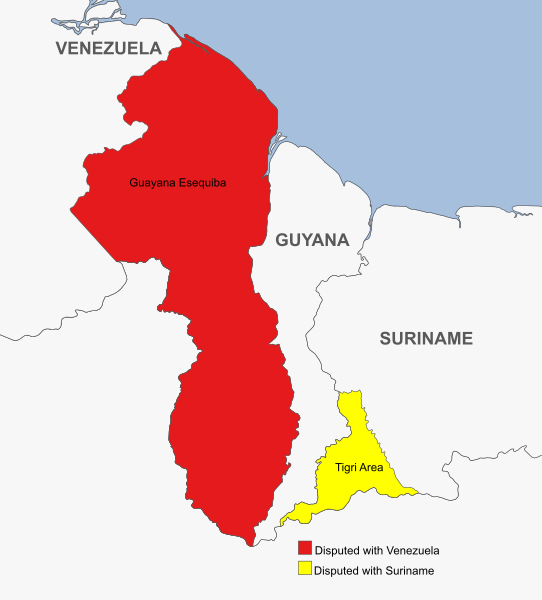Like many of us, Colby Cosh is trying to figure out what’s going on in Venezuela these days, as the government “won” a plebiscite to push its long-standing claim for a huge chunk of next-door neighbour Guyana’s territory:

Map showing the two disputed land areas of Guyana. The red region is disputed with Venezuela (Guayana Esequiba) and the yellow region is disputed with Suriname (Tigri or New River Triangle)
Map by SurinameCentral via Wikimedia Commons.
I’ve been plunging into the weeds — as some of my readers perhaps are — trying to figure out why Venezuela is trying to take over three-quarters of the land area of neighbouring Guyana. I mean, yes, duh, the simple answer is “oil”. The relevant part of Guyana — the sparsely populated, heavily Indigenous Essequibo region west of the river of the same name — has been claimed by Venezuela with varying degrees of vigour and indignation since it became independent from Spain. In the last decade or so, it has come to light there is abundant oil beneath the continental shelf belonging to the Essequibo area.
It might, in fact, be enough oil to make Guyana the world’s largest crude producer in a manner of months. Such an event would almost certainly create an unbearable crisis for the radical-left Venezuelan government, which has fouled up its own oil industry, obliterated its currency and created the single largest refugee crisis in the recorded history of the Americas. And so, the North Korea of the Western Hemisphere is suddenly behaving in an awfully warlike — one might say imperialistic — manner towards a tiny neighbour. Which is, in turn, why the United States is rattling the sabre in Guyana’s defence.
The basic situation in the Essequibo region in the centuries after Columbus was that the territory de jure belonged to Spain but was often really in the hands of Dutch mariners and colonists. There was a long cycle of Dutch incursion and Spanish retaliation. Venezuela inherited and pursued the Spanish claims upon independence — originally as part of the Republic of Gran Colombia (1811) and then as a sovereign state unto itself (1830). Britain gained the Dutch territory in the Napoleonic Wars and incorporated Essequibo into the unified colony of British Guiana in 1831.
The two countries recognized that they had a big disagreement over where the Venezuela-British Guiana border might actually lie. But Venezuela wasn’t in a position to pick a fight with the British Empire, and British public opinion couldn’t be convinced to care very much about the problem. The two countries kicked the can down the road and mutually agreed not to colonize the area.
Fast-forward a bit: in the 1870s, gold was discovered in the disputed zone, waaay over toward the Venezuelan side, and in the 19th century, gold meant a gold rush. British and American privateers started turning up with shovels and pickaxes in the interior, sovereignty be damned. Venezuela eventually began to lobby the U.S. executive branch for redress, reminding American politicians of their precious Monroe Doctrine (which was technically incompatible with the existence of a “British Guiana”). Britain, coming under uncomfortable diplomatic pressure, agreed to submit the border question to neutral arbitration.
And here we come to the heart of the quarrel. The U.S. and Britain set up an arbitration panel of the classic 19th-century kind — the same kind of panel, in fact, that fixed up much of the U.S.-Canada border during the same period. This panel had two American Supreme Court justices representing Venezuelan interests; two equally high-ranking British judges; and a neutral fifth man borrowed from the Russian Empire — the Estonian international-law scholar Friedrich Martens (1845-1909). Throughout the 19th century, Russia had often been used in this way by western powers as an honest broker, and arbitration was seen as a universal means of peaceful dispute resolution — the great hope of the world’s future.
And yet, like what seems to be every border dispute in South America since the Spanish skedaddled, an agreement doesn’t seem to last more than the lifetime of one of the governments that negotiated it and some of them aren’t even that durable. Ed Nash has a video summarizing the economic and military state of affairs that helps explain why this dispute is potentially of global concern.



